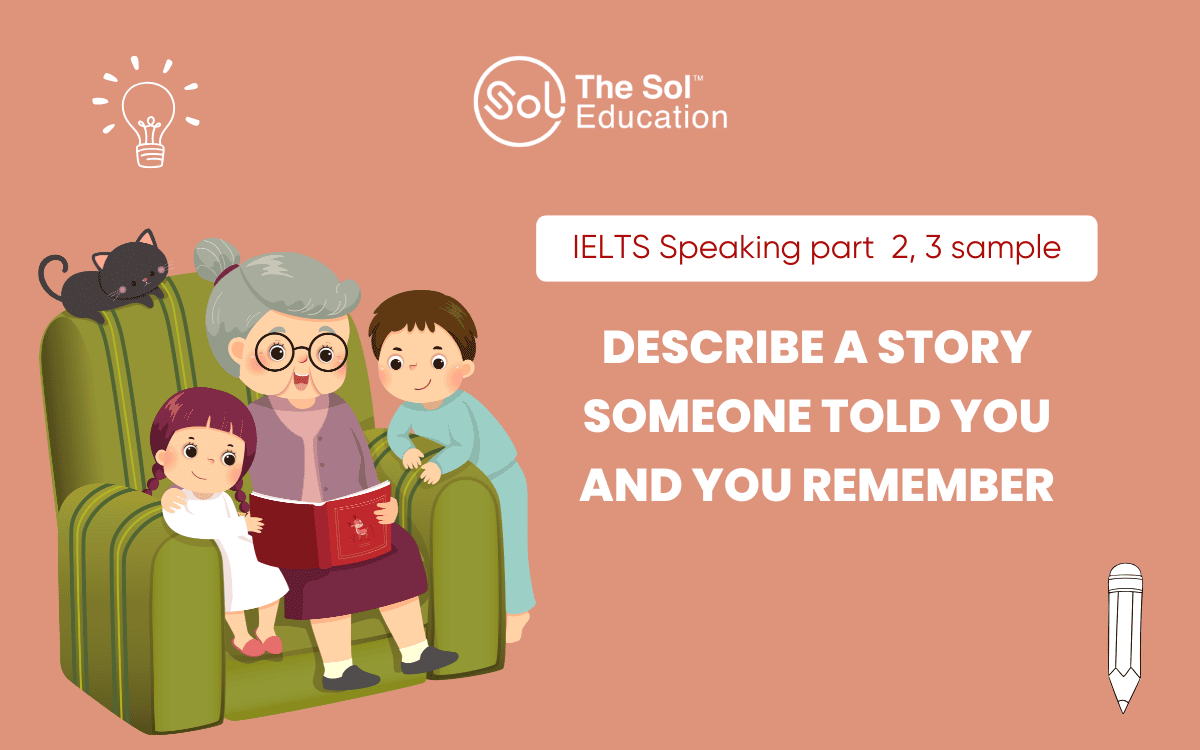Describe a story someone told you and you remember là một đề bài có thể xuất hiện trong phần thi IELTS Speaking Part 2. Để đạt điểm cao, câu trả lời của bạn cần có cấu trúc rõ ràng, sử dụng từ vựng phong phú và có sự kết nối hợp lý giữa các ý. Trong bài viết này, SOL IELTS sẽ cung cấp cho các bạn một số sample answer để có thể chuẩn bị thật tốt cho bài nói của bạn nhé.

Describe a story someone told you and you remember
You should say:
Để chuẩn bị cho bài nói này, bạn có thể làm theo các bước sau:
One of the most memorable stories I have ever heard was a Vietnamese folktale that my grandmother told me when I was a child. It was the story of "The Toad Who Brought the Rain" (Con Cóc Là Cậu Ông Trời), a tale about bravery and determination.
The story follows a small but courageous toad who sets out on a journey to ask the Heavenly Emperor to bring rain to the dry land. Along the way, he meets other animals like a tiger, a fox, and a bee, who all join him. When they reach the emperor’s palace, the toad bravely demands rain, and through clever teamwork, the animals manage to convince the emperor to listen. Eventually, the rain returns, and the land is saved.
I remember this story vividly because my grandmother used to tell it with so much emotion, using different voices for each character. She told me that the story teaches us about perseverance and unity—even small creatures, when working together, can achieve great things.
Even now, as an adult, I find this story inspiring. It reminds me that no matter how insignificant we may seem, we can still make a difference if we stand up for what is right. It also brings back warm childhood memories of sitting beside my grandmother, listening to her gentle voice.
One of the most memorable stories I have ever heard is "The Legend of Mai An Tiêm", which is a well-known Vietnamese folktale.
My grandmother told me this story when I was a child. She used to tell me bedtime stories, and this one left a strong impression on me. The story is about Mai An Tiêm, a man who was exiled to a deserted island by the king. Despite the harsh conditions, he remained determined and resourceful. He discovered watermelon seeds, cultivated them, and eventually turned the island into a prosperous place. His perseverance and hard work paid off, and he was later allowed to return home.
I remember this story because of its valuable lesson about self-reliance and resilience. It taught me that success comes from hard work and determination, even in difficult circumstances.
Every time I face challenges in life, I think of this story and remind myself to stay strong and never give up. It has truly shaped my mindset and made me believe that hard work always leads to rewards.
A story that I will never forget is the life story of Nick Vujicic, which my teacher shared with our class during a lesson on perseverance.
Nick Vujicic was born without arms and legs, yet he overcame tremendous difficulties to become a successful motivational speaker. Despite his physical limitations, he never let them define him. Instead, he learned to adapt, develop a positive mindset, and inspire millions of people around the world with his speeches.
I remember this story because it was incredibly inspiring. It made me realize that no matter how difficult life gets, there is always a way to overcome obstacles. His story changed my perspective on challenges, and now, whenever I feel discouraged, I remind myself of his words: "If I fail, I try again, and again, and again."
Hearing about his journey has given me the motivation to work harder and appreciate the things I often take for granted.
Sample Answer 1:
I personally prefer paper books because they offer a more immersive reading experience. The tactile sensation of flipping through pages and the smell of a book create a connection that e-books simply cannot replicate. Moreover, reading a physical book reduces screen time, which is crucial for maintaining good eye health. However, I do acknowledge that e-books are more portable and convenient, especially for those who travel frequently.
Sample Answer 2:
From my perspective, e-books are far superior due to their convenience and affordability. They allow readers to store thousands of books on a single device, making them ideal for students and professionals. Additionally, features like adjustable font sizes and built-in dictionaries enhance the reading experience. While some people argue that e-books lack the authenticity of printed books, I believe the advantages far outweigh this minor drawback.
Useful Vocabulary:
paper books /ˈpeɪpər bʊks/: sách giấy
immersive /ɪˈmɜːrsɪv/: lôi cuốn, hấp dẫn
tactile /ˈtæktaɪl/: liên quan đến xúc giác
screen time /skriːn taɪm/: thời gian sử dụng màn hình
portable /ˈpɔːrtəb(ə)l/: dễ mang theo
convenience /kənˈviːniəns/: sự tiện lợi
affordability /əˌfɔːrdəˈbɪləti/: tính hợp túi tiền
authenticity /ˌɔːθenˈtɪsɪti/: tính chân thực
Sample Answer 1:
Yes, I believe smart devices can have both positive and negative impacts on family relationships. On one hand, they help parents stay connected with their children through messaging and video calls. However, excessive use of gadgets may lead to communication breakdown, as children become too absorbed in their screens to interact with their parents. Therefore, it is essential to set clear screen time limits to maintain a healthy balance.
Sample Answer 2:
In my opinion, smart devices are gradually weakening the bond between parents and children. Many kids nowadays spend hours on social media or video games instead of engaging in meaningful conversations with their families. This lack of interaction may cause emotional distance, making it harder for parents to understand their children’s thoughts and feelings. Parents should encourage more face-to-face interactions to strengthen family ties.
Useful Vocabulary:
smart devices /smɑːrt dɪˈvaɪsɪz/: thiết bị thông minh
connected /kəˈnɛktɪd/: có kết nối
communication breakdown /kəˌmjuːnɪˈkeɪʃən ˈbreɪkdaʊn/: sự gián đoạn giao tiếp
screen time limits /skriːn taɪm ˈlɪmɪts/: giới hạn thời gian sử dụng màn hình
weakening /ˈwiːkənɪŋ/: làm suy yếu
emotional distance /ɪˈmoʊʃ(ə)n(ə)l ˈdɪstəns/: khoảng cách tình cảm
face-to-face interactions /feɪs tu feɪs ˌɪntərˈækʃənz/: tương tác trực tiếp
Sample Answer 1:
I think children are naturally drawn to stories because they ignite their curiosity and allow them to explore different worlds. Through storytelling, they can live through exciting adventures and understand emotions in a way that real-life experiences might not provide. Furthermore, many stories are told in a rhythmic or interactive way, which makes them even more engaging for young minds.
Sample Answer 2:
In my view, kids enjoy stories because they provide a sense of wonder and comfort. Listening to bedtime stories, for instance, creates a safe and familiar routine that many children look forward to. Moreover, stories are often embedded with valuable lessons, helping kids learn about kindness, perseverance, and moral values in an enjoyable manner.
Useful Vocabulary:
ignite their curiosity /ɪɡˈnaɪt ðɛr ˌkjʊəriˈɒsɪti/: khơi dậy trí tò mò
rhythmic /ˈrɪðmɪk/: có nhịp điệu
interactive /ˌɪntərˈæktɪv/: có tính tương tác
sense of wonder /sɛns əv ˈwʌndər/: cảm giác kỳ diệu
valuable lessons /ˈvæljuəb(ə)l ˈlɛsənz/: bài học quý giá
Sample Answer 1:
People often use expressive voices, gestures, and even props to bring stories to life. By doing this, they make the storytelling session more captivating and help children visualize the story better. Additionally, pausing to ask questions or letting kids predict the ending fosters engagement and critical thinking.
Sample Answer 2:
Nowadays, many people incorporate multimedia elements such as audiobooks and animated videos to enhance storytelling. This approach makes stories more dynamic and keeps children’s attention longer. While some argue that traditional storytelling is better, I believe a mix of both methods can be the most effective.
Useful Vocabulary:
expressive voices /ɪkˈsprɛsɪv ˈvɔɪsɪz/: giọng điệu diễn cảm
captivating /ˈkæptɪveɪtɪŋ/: lôi cuốn
engagement /ɪnˈɡeɪdʒmənt/: sự tham gia
multimedia elements /ˌmʌltiˈmiːdiə ˈɛlɪmənts/: yếu tố đa phương tiện
Sample Answer 1:
Technology has redefined storytelling by introducing immersive experiences like virtual reality and interactive e-books. These innovations make stories more engaging and enable readers to participate in the narrative rather than just passively consuming it.
Sample Answer 2:
In my opinion, technology has made storytelling more accessible and inclusive. Now, people from all walks of life can share their stories through podcasts, blogs, and digital platforms. This has led to a greater diversity of stories being told, enriching our understanding of different cultures and perspectives.
Useful Vocabulary:
redefined /ˌriːdɪˈfaɪnd/: tái định nghĩa
virtual reality /ˈvɜːrtʃuəl riˈæləti/: thực tế ảo
accessible and inclusive /əkˈsɛsɪb(ə)l ənd ɪnˈkluːsɪv/: dễ tiếp cận và bao quát
greater diversity /ˈɡreɪtər daɪˈvɜːrsɪti/: sự đa dạng lớn hơn
Chúc các bạn học tốt nhé.
